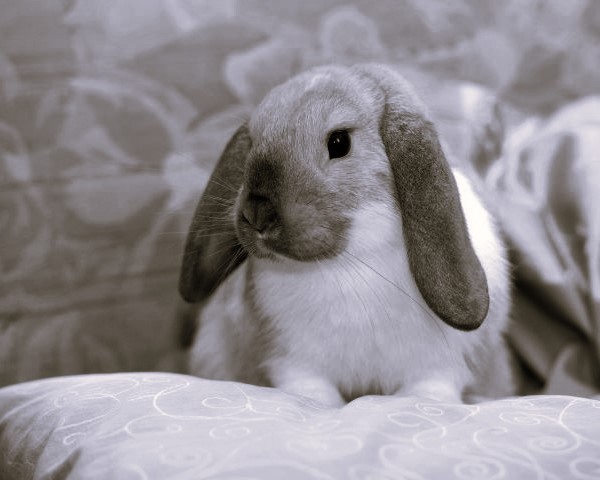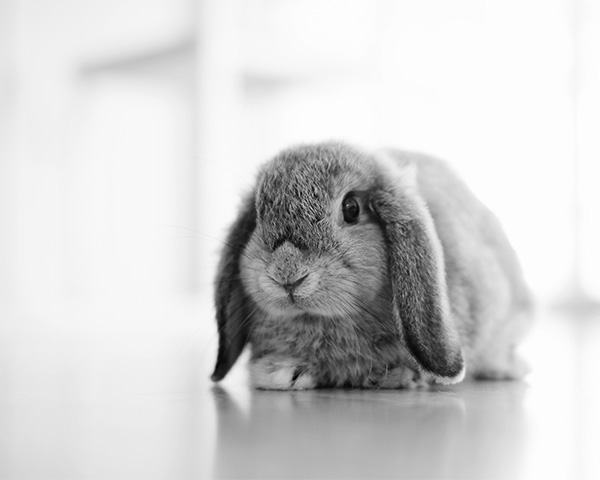Lop rabbit breed information and advice
Instantly recognisable thanks to their signature floppy ears, Lop rabbits are super cute, snuggly bunnies. Friendly, loving and oh so soft, Lop rabbits make great family pets.
There are several different varieties of Lop rabbits, each with slightly different characteristics. These include:
- English Lop
- French Lop
- German Lop
- Holland Lop
- Mini Lop
- Dwarf Lop
- Mini Lion Lop
In this guide we’ll mostly talk about the English Lop, which is considered the original lop-eared rabbit. However, many of the care tips and advice will apply to all lop breeds. One thing they all have in common is their adorable floppy ears.
Read on to learn all about the Lop rabbit, from their care needs and diet to grooming and lifespan.
Lop rabbit facts

| Lifespan | Up to 10 years |
| How much | £10 – £100 |
| Size | 35 – 45 cm |
| Weight | 4 – 5.5 kg |
| Colours | black, fawn, opal, grey, red-eyed white, blue and black tortoise shell |
| Grooming | low grooming needs but regularly check their ears |
| Temperament | friendly, calm, placid |
| Exercise | low exercise needs |
Pet insurance for your Lop rabbit
Lop rabbits are docile and gentle bunnies, but they can be prone to various health problems. Their long ears can cause them problems, and they can inherit other conditions too, such as:
- Misaligned and overgrown teeth
- Ear pain
- Excess ear wax
- Obesity
Taking out rabbit insurance can help protect you financially if your Lop rabbit needs veterinary care.
Sainsbury’s Bank Pet Insurance for Lop rabbits
We offer Lifetime insurance for rabbits with Sainsbury’s Bank. Lifetime insurance covers your Lop rabbit up to a maximum amount each year. You can claim towards things like:
- Veterinary fees
- Dental cover
- Emergency boarding fees
- Physiotherapy
- Complementary treatment.
You can take out a new policy for your bunny from eight weeks old – right up until their fifth birthday. Please note that our rabbit insurance won't cover any pre-existing conditions and that terms, conditions, excesses, exclusions and limitations apply.
How to care for a Lop rabbit
Lop rabbits are cuddly, calm and very cute. They’re not hugely active bunnies, and their large ears can make them susceptible to the cold, so they’re better suited to living indoors. Find out more about caring for this loving breed below.
Feeding and nutrition
Rabbits need a good balanced diet. They should get most of their calories from grass or hay , with additional leafy greens, vegetables, and dry food to ensure they’re getting enough nutrients.
Lop rabbits aren’t fussy and will happily eat vegetable peelings, weeds and other things we might consider “waste”. It’s important not to feed your rabbit lawn clippings from your lawn mower, as these could contain petrol or chemical residue from the machinery. Lop rabbits can also be prone to weight gain, so it’s important not to feed them the wrong types of food.
Grooming
Lop rabbits have short fur that they will keep clean themselves, so they don’t require much grooming. But it is important to check their nails, ears and teeth regularly, as they can suffer from dental and ear conditions. Check for wax build up inside their ears, and examine their floppy ears to make sure they don’t have any cuts or sores that could become infected from contact with the floor.
Exercise
Lop rabbits are a docile and relaxed breed, so they don’t need much daily exercise. Exploring during a run outdoors or having some time to hop around indoors will keep them content. Their floppy ears can become damaged if they run around too much from dragging on the floor, so make sure to keep an eye on them.
Training
Lop rabbits are intelligent and can be trained to use a litter tray and even walk on a lead. They can also be taught to come when called, which is great if you let your lop roam freely in the house. Remember to use treats sparingly while training though, as lops can be prone to weight gain.
Temperament and behaviour
Calm and docile , Lop rabbits make great family pets. They are gentle and loving, and like nothing more than a cuddle or a stroke with their pet parents. They also need space to roam, whether that’s inside the house or in a run in the garden during warm weather.
Common health problems
Lop rabbits are more prone to certain health conditions than other rabbit breeds, including:
Ear problems
Their long ears might be cute, but they can cause problems in this bunny breed. The ends can get sore or infected from dragging on the ground. It’s important to keep their nails trimmed to avoid injury if they step on their own ears.
Wax buildup is also common in Lop rabbits, so regularly check their ears to make sure they’re clean and healthy. Syringing may be necessary for painful wax build-up.
The large surface area of the ears means the Lop is more likely to feel the cold, as the ears have lots of blood vessels. It’s better to keep them indoors, especially during the winter months.
Obesity
Lop rabbits tend to be less active than other breeds, which means they can gain weight easily. Ensure that you’re feeding them the right quantities of food to prevent weight gain. Your vet should be able to advise on a healthy weight and diet.
Dental problems
Brachycephaly affects the breathing, tooth growth and tear ducts of short-nose bunnies. Over recent years, Lionhead rabbits have been increasingly bred with flattened faces, making them vulnerable to this condition.
In brachycephalic Lionheads, the top jaw grows longer than the bottom (known as malocclusion), which can lead to dental problems such as overgrown teeth. Respiratory issues are also common. Rabbits only breathe through their nose. If you see your lion bunny breathe through their mouth, this could be a sign that there’s a problem.
So, is a Lop rabbit right for you?
Gentle and intelligent, Lop rabbits make ideal family pets. They’re easy to look after and don’t require much exercise or grooming, meaning they can be great companions for busy families.
But, their long ears do mean they need some additional care in the form of wax build up and potential injury from dragging on the floor. Rabbit insurance can help cover the cost of treatment or vet bills, to help you enjoy your bunny’s company with less stress.
Frequently asked questions
Do lop rabbits have more health problems?
Lop-eared rabbits are more likely to suffer from health problems than those with ‘erect’ ears. A 2019 study by the Royal Veterinary College confirmed they’re more prone to ear problems like ear pain and excess wax . And dental problems are a common as well – with misaligned and overgrown teeth affecting a lot of Lops.
Are Lop bunnies cuddly?
Yes, Lop bunnies are cuddly and friendly. They like to be stroked and are happy to be held and picked up, which makes them a great family pet suited to young children.
Are lop bunnies high maintenance?
Lop rabbits are generally easy to care for, with low exercise and grooming needs. As long as they have a balanced diet and space to explore, they will be content. They’re also easy to litter train so they won’t leave a mess around the house.

Browse our guides
Choose from our list of helpful guides and information

Explore rabbit breeds
Find out how to keep your rabbit healthy and happy

Cat breed guides
How to care for your cat, common health problems and more
Terms and conditions
Important information
* The discount is based on information related to you and the Sainsbury’s and Sainsbury’s Bank transactions linked to your Nectar account. For more information on how we use your data, go to sainsburysbank.co.uk/privacy
Sainsbury's Bank plc, Registered Office, 33 Holborn, London EC1N 2HT (registered in England and Wales, no. 3279730) is authorised by the Prudential Regulation Authority and regulated by the Financial Conduct Authority and the Prudential Regulation Authority (register no. 184514). Sainsbury's Supermarkets Ltd is an appointed representative of Sainsbury's Bank plc.
Sainsbury's Bank plc acts as an introducer to Pinnacle Insurance plc who is authorised by the Prudential Regulation Authority and regulated by the Financial Conduct Authority and the Prudential Regulation Authority (register number 110866). Registered Office: Pinnacle House, A1 Barnet Way, Borehamwood, Hertfordshire, WD6 2XX. Sainsbury’s Bank plc and Pinnacle Insurance plc are not part of the same corporate group.
